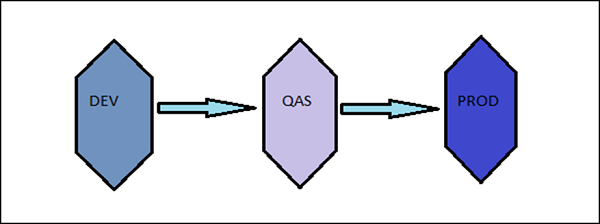SAP Architecture is defined as a technology framework of SAP system and it changes with time unlike the system landscape. SAP Architecture changes with new software like SAP ECC 6.0, the most recent one.
The following is a request in SAP System Landscape - DEVELOPMENT >>>> Quality >>>> PRODUCTION
The following figure represents SAP three tier system landscape where work flows from Dev > QAS > PROD and not in backward direction.
Let us now discuss the system landscape -
Sandbox Server
When a project is implemented, at the initial stages, a sandbox server is used where all the customization, configuration is performed.
Development Server
Next is to save the configuration in development server and saved in workbench requests and this has to be transported to Production server.
Production Server
You can consider it as the final or the most refined stage where the work is done when project is in production/go live. All the changes that are required by the client are performed in the DEV environment and later, the request is transported to production.
SAP System 3 – Tier Architecture
The image given below shows 3-tier architecture of the SAP system. The presentation layer is the topmost one. This contains the device/application to control the SAP system. This can include mobile devices, end user systems or SAP GUI or web browser based client.
The presentation layer communicates with the application server to perform all the processing and which is known as brains of an SAP system.
An application server consists of multiple instances and communicates with the database layer of the three-tier architecture.
The bottom layer is called the database layer. This is responsible to store all the data. The database of SAP system is kept on a separate server for performance and security reasons.
The presentation layer consists of different components for ABAP and JAVA that enables the communication and processing of data in SAP system.
The key components of the presentation layer include the following:
Message Server - This is used to manage communication between distributed dispatchers in the ABAP system.
Message Server - This is used to manage server processes and JAVA dispatchers. It is used to manage communication within JRE.
Dispatcher Queue - This is used to store multiple work process types.
Dispatcher - This is used to distribute the requests to the work processes.
Memory Pipes - This is used to manage communication between ICM and ABAP work processes.
Enqueue Server - This is used to handle logical locks set by the executed Java application program.
Java Dispatcher - This is responsible to receive the client requests via presentation layer and forward to the server process.
Gateway - This is used to manage communication between SAP system and external systems.
ABAP Work processes - This separately executes dialog steps in R/3 applications separately.





Everyone wants to get unique place in the IT industry’s for that you need to upgrade your skills, your blog helps me improvise my skill set to get good career, keep sharing your thoughts with us.
ReplyDeleteDRM Online Training
DRM Training
Very good article. Really looking forward to read more. Awesome.riverside ca landscaping
ReplyDeleteSAP Grc online training
ReplyDeleteSAP Secrity online training
oracle sql plsql online training
go langaunage online training
azure online training
java online training
As a professional bend fence and deck designer and developer, it's very easy to describe different issues related to outdoor landscaping designs. However, have you ever imagine how much emblematic and intricate it would be to create different landscaping designs for different customers in almost different conditions every time. When observed from a normal human being's eye you will experience only the beauty of landscaped designs and enjoy the natural soothing feel provided by those landscaped designs.
ReplyDeleteI loved your post.Much thanks again. Fantastic.
ReplyDeleteSAP Secrity training